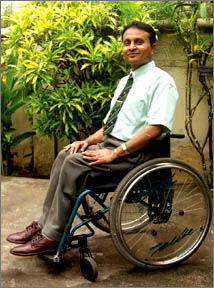|
observer |
|
|
|
|
|
OTHER LINKS |

|

|

|
Good access wins customersThe number of people who need assistance for mobility such as walking and climbing is increasing and according to statistics it is around 30% of our population.
Therefore providing good access to every building is a necessity and a moral duty of every business establishment and citizen in this country as anybody can be a victim of an accident or fall ill today or tomorrow. The quality of life you then enjoy will depend greatly upon how accessible, accommodating and user friendly the living environment around you could be. At present the estimated 30% of our population are silently fighting an uphill battle for access and accommodation. The government gazetted regulations last October to make all new public buildings and places designed and constructed to enable everyone equal access with dignity and safety. The existing buildings have been given a three-year grace period until 2009 to fall in line with this regulation. It is not only victims of accidents, illnesses and debilitating medical conditions such as back and hip problems but the number of elders too who have to look after young children are also on the rise in our society. There are shoppers with heavy luggage too and every customer will benefit during the rush hour when you provide good access to the business and it will definitely attract more customers to your business. For instance the England team is due Sri Lanka in November but none of the stadiums has facilities for the differently abled persons. With businesses competing with one another can you afford to miss any of these opportunities? You will definitely have an edge over the others if you provide good access to your businesses. Dr. Ajith C. S. Perera, himself a victim who is confined to a wheel-chair said "when I can enter any business establishment with dignity and safety I feel welcome and it gives me a feeling of belongingness and being wanted by them. These are the places that I will go back and take my friends as well." These are the businesses that care for all people. If the environment is not conducive I won't go there again. Every customer is a business opportunity. Therefore if a customer is missed out it is a business opportunity lost. He said that embracing diverse mobility needs of a wide range of people is good business sense, especially at a time when competition is high business should be attractive to all people. This should be considered as an investment and not as an expenditure. For example restaurants, supermarkets, cinemas, banks, and post offices should be made enabling environments and every person can be greatly helped to restore normality by the enforcement of good building practices. The benefits of an enabled environment are immense and includes accommodating all people with choice and dignity, encouraging innate human potential, enhancing self-reliance, making everyone truly productive able and fully fledged citizens, increasing opportunities for gainful employment, recreation, shopping, banking, education, communication and travel, reduce poverty, minimise unwanted dependencies and bring prosperity to businesses as their environments will cordially welcome and embrace all customers and sets out a big way forward to individual members, their immediate family members, businesses, society and at the end to the country. He said that by making the building accessible to all they will be contributing to make all people make the optimum use of the building and its facilities for which it was designed and built and thereby maximise independence and safety with dignity. But the needs should be identified by doing a needs assessment by someone competent on the practical aspect of the subject and designing and creating correctly the correct things. Once it is built it should also be maintained properly. Dr. Perera said that it is not morally correct to claim as an equal opportunity employer until and unless the building is empathetically modified to accommodate everyone with dignity. He said that architects and builders are the custodians of our living environments. It's their moral duty to consider the inevitable drop in human ability when planning constructions. It will arrest social exclusions created by man to its own kind which has already caused a series of rising social problems of national importance. **** Dr. Ajith C. S. Perera, a product of the University of Colombo is a Chartered chemist by profession. He was a Senior anager/Director with two multi-national pharmaceutical companies. He is also a Fellow of several reputed international bodies. He is already a pioneer campaigner on the theme enabling environments for everybody and a member of the National Council for Disabled people who together with the Ministry of Social Welfare was responsible for introducing regulations in October 2006 to make public Building and Places enabling for all. His untiring efforts have seen several built environments at some private banks, Hotel Taj Samudra and two post offices empathetically modified to enable all people equally. |








